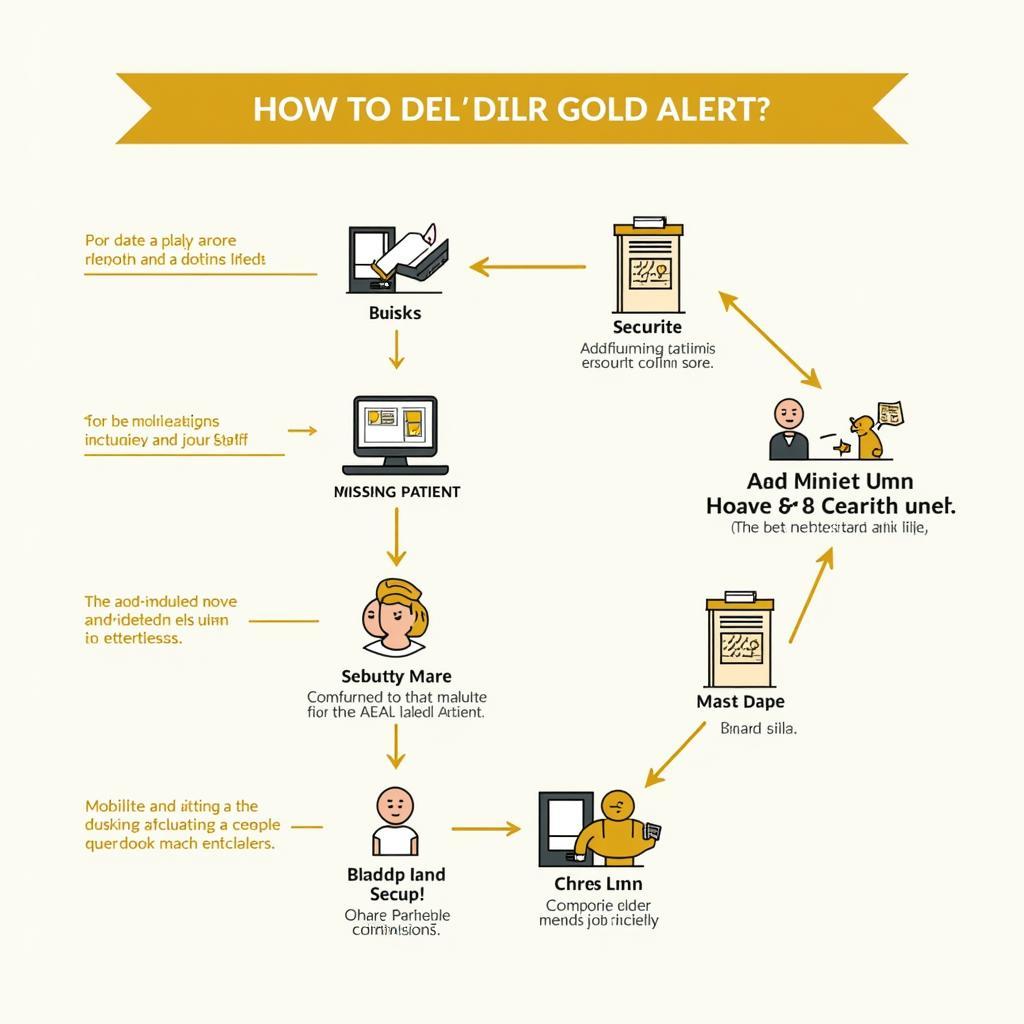A gold alert in a hospital signals a critical situation, requiring immediate attention and resources. It’s crucial to understand what triggers a gold alert, its implications, and how it impacts patient care. This article will delve into the intricacies of gold alerts, providing valuable insights for both healthcare professionals and the general public.
What is a Gold Alert?
A gold alert, sometimes referred to as a “Code Gold,” indicates a missing patient within the hospital setting. This patient may be at risk due to various factors, including dementia, cognitive impairment, or a medical condition requiring urgent treatment. The prompt activation of a gold alert is paramount to ensuring the patient’s safety and well-being.
Different Types of Gold Alerts
While the core purpose remains consistent, some hospitals employ variations of the gold alert, categorizing them based on the level of risk. For instance, a gold alert might be designated for a wandering patient with dementia, while a different code might be used for a patient who has eloped against medical advice, posing a significant threat to their health.
Why are Gold Alerts Issued?
Gold alerts are initiated to swiftly locate missing patients and prevent potential harm. The reasons for a patient going missing can vary, ranging from confusion and disorientation to intentional elopement. Understanding these underlying causes is vital for developing effective prevention strategies.
Common Causes of Patient Elopement
- Cognitive Impairment: Patients with dementia or other cognitive impairments may wander or become lost due to confusion.
- Medical Conditions: Certain medical conditions can lead to disorientation or altered mental status, increasing the risk of elopement.
- Emotional Distress: Patients experiencing anxiety, fear, or other emotional distress might attempt to leave the hospital against medical advice.
- Substance Abuse: Individuals struggling with substance abuse may exhibit unpredictable behavior, including elopement.
 Gold Alert Activation Process in Hospital
Gold Alert Activation Process in Hospital
The Gold Alert Procedure
When a patient is determined to be missing, a gold alert is activated. This typically involves notifying security personnel, staff members, and sometimes even local law enforcement. The hospital then initiates a systematic search of the premises and surrounding areas.
Steps Taken During a Gold Alert
- Confirming the Missing Patient: Verify the patient’s absence and rule out routine movements within the hospital.
- Notifying Security and Staff: Immediately alert security personnel and all hospital staff about the missing patient.
- Initiating a Search: Conduct a thorough search of the hospital, including patient rooms, common areas, and exterior grounds.
- Reviewing Security Footage: Examine security camera footage to trace the patient’s last known location and movement patterns.
- Engaging Local Law Enforcement (if necessary): If the patient cannot be located within the hospital, involve local law enforcement in the search.
 Hospital Security Team Searching for Missing Patient
Hospital Security Team Searching for Missing Patient
Preventing Gold Alerts: Proactive Measures
Hospitals are continuously striving to minimize the occurrence of gold alerts by implementing proactive measures. These strategies focus on identifying patients at risk and implementing safeguards to prevent elopement.
Strategies for Preventing Patient Elopement
- Risk Assessment: Conduct thorough risk assessments upon admission to identify patients at high risk of elopement.
- Environmental Modifications: Implement environmental modifications such as secured units, door alarms, and coded access points.
- Patient Identification: Utilize patient identification bracelets and other tracking technologies to monitor patient location.
- Staff Education: Provide ongoing training to staff members on recognizing and responding to potential elopement situations.
“Regular training for staff is essential to ensure a coordinated and effective response to a gold alert situation,” states Dr. Amelia Hernandez, Chief of Psychiatry at San Jose Hospital. “A swift and organized response can significantly impact a patient’s safety.”
The Importance of Family Involvement
Family members play a crucial role in preventing gold alerts. By providing information about the patient’s medical history, cognitive abilities, and behavioral patterns, they can assist hospital staff in developing individualized care plans.
How Families Can Help
- Communicate Openly: Share relevant information with the healthcare team about the patient’s history and potential risks.
- Stay Vigilant: Remain attentive to the patient’s whereabouts and behavior during visits.
- Partner with Staff: Collaborate with the healthcare team to develop and implement safety strategies.
 Family Meeting with Medical Staff Regarding Patient Care
Family Meeting with Medical Staff Regarding Patient Care
“Family involvement can be invaluable in preventing elopement,” adds Dr. Michael Nguyen, Director of Geriatric Medicine at San Jose Hospital. “Their insights can significantly enhance our ability to provide a safe and secure environment.”
Conclusion
Understanding the significance of a gold alert in a hospital is crucial for ensuring patient safety. By implementing proactive measures, fostering communication, and providing thorough training, hospitals can effectively minimize the risk of patient elopement and ensure timely intervention when necessary. At San Jose Hospital, we are committed to providing a secure and supportive environment for all our patients. If you have concerns about a loved one’s safety, please discuss them with our medical team.
FAQs about Gold Alerts
- What should I do if I see a patient wandering who appears lost?
- How often do gold alerts occur in hospitals?
- Are gold alerts only for patients with dementia?
- What information is shared during a gold alert?
- How can I help prevent a gold alert for my family member?
- What technology is used to assist in locating missing patients?
- What is the difference between a gold alert and a code silver?
For further information, please refer to our articles on patient safety and security protocols. We encourage you to explore the resources available on our website.
When you need assistance, please contact us: Phone: 02437655121, Email: [email protected] Or visit us at: 298 Cau Dien Street, Minh Khai, Bac Tu Liem, Hanoi, Vietnam. We have a 24/7 customer service team.